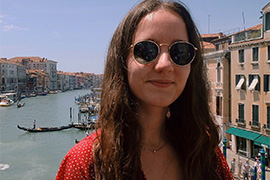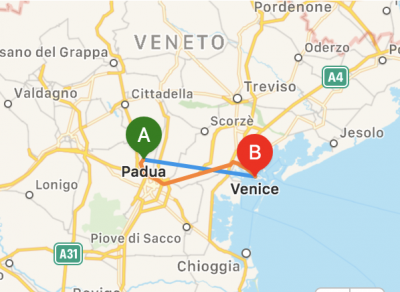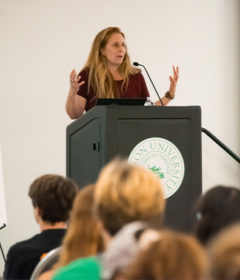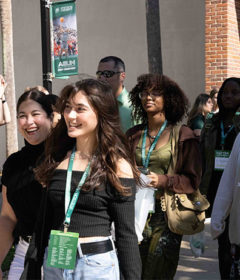Stetson student returns home to lockdown in Italy

Stetson junior Rebecca Guerra decided to book a flight home to Italy on the day that the university announced it would move classes online, due to the worldwide COVID-19 outbreak.
Guerra, a finance and economics major in the Roland George Investments Program, left the next day, March 13. On the trip, she took precautions against the virus, washing her hands as often as she could and making sure not to touch her face. She kept as much safe social distance as she could from others.

“As soon as I heard the news about the decision to block flights from Europe, I got concerned I would have not been able to return home, therefore I planned to fly back to Italy as soon as possible,” she recalled. “My trip home was quite a long one. I had to stop in Toronto and Frankfurt. As soon as I got in Frankfurt, I found out that my flight to Venice was canceled and I had to wait some more hours to catch the following one.”
At the Venice airport, volunteers for the Red Cross were taking passengers’ temperatures to make sure no one had a fever, one of the most common symptoms of the coronavirus infection. Guerra and other passengers needed to fill out documents saying they were Italian residents and promising to immediately self-quarantine for 14 days in their homes.
Guerra lives with her father in Padua, a city about 25 miles west of Venice. By late February, COVID-19 cases were surging in Italy and the government began locking down towns to slow the spread of the disease. Fortunately, she and her father have remained in good health.

“I stayed as far away from him as possible for 14 days in order to minimize the chances of putting him in danger since I had recently been in three different airports,” she said. “My dad followed the guidelines given by the government from the very beginning, when these measures were first recommended. I believe this helped him minimize the probability of getting sick.”
While on lockdown, Guerra is keeping up with her classwork online and anxiously watching the world markets. “It is definitely a very challenging time for the stock market, which is why working in the RGIP program is becoming more and more interesting,” she added.
Her home country has reported more than 10,000 deaths and 92,000 confirmed cases, making it the deadliest hotspot in the world, CNN reported on March 30. The situation there is dire, she said.
“Hospitals are very close to being at full capacity and doctors are struggling in order to provide patients with the best cures,” she explained, adding that the shortages of ventilators, masks and other medical supplies are making their jobs difficult and dangerous.
She urges others to follow the precautions outlined by governments and medical experts.
“Doctors, nurses, healthcare professionals, and everyone who is working every day to help us get through this situation deserve to be prized for their job, which is why I think respecting the government’s guidelines by staying home is such an insignificant sacrifice we owe to them and to those who are suffering,” she said.
-Cory Lancaster
Stetson Today, the university’s news site, would like to tell the stories of how COVID-19 is impacting the Stetson Community here and around the world. If you have a story to share (with photos and/or video), please email Stetson Today editor Cory Lancaster at [email protected].



